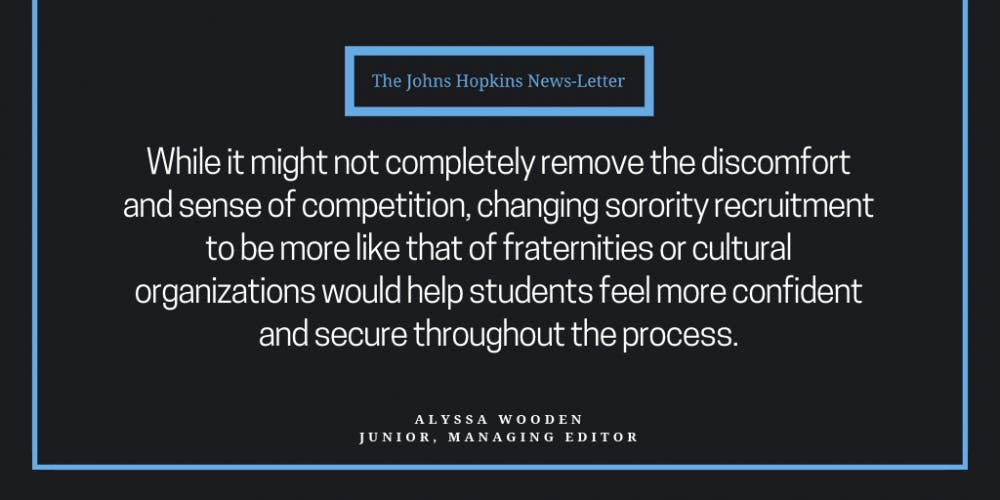This weekend, hundreds of underclassmen will go through the process known as formal recruitment in the hopes of joining one of the five Panhellenic sororities at Hopkins. For many students across the country, Greek life is a crucial aspect of their college experience. It’s where they meet their closest friends, find personal and academic support and make professional connections. But for some, the actual recruitment process evokes none of those positive qualities.
It’s no secret that formal recruitment – and sorority life in general – can be overwhelming, especially at larger Southern schools. In many ways, Hopkins is a lot more low-key: there are no sorority houses, dues are typically cheaper and you don’t need to submit letters of recommendation to join. The recruitment process itself, though, is largely universal. Interested students visit each of the school’s chapters the first day, then are invited back to fewer and fewer chapters until one finally awards them a bid. At every university, certain chapters have higher “recruiting strengths” than others: they’re perceived as more desirable, and students are more interested in being invited back to those chapters.
I went through recruitment myself as a freshman. Now, as a member of the Panhellenic Association at Johns Hopkins (PAJH), I have been working all of last semester to plan this weekend’s events. I’ve witnessed firsthand how difficult the process can be, especially for freshman who are just starting their second semester and might not yet have very well-established social networks.
I’ve seen people burst into tears or drop out of recruitment altogether because they don’t get invited back to the organization they’ve had their heart set on. They stress over seemingly insignificant things, like what shoes they’re wearing or if they’re running late to an event. They’re afraid that the group they end up joining will determine their social status for the next four years.
To someone on the outside, the recruitment process may seem inefficient. Potential new members are supposed to decide which chapter they’re going to spend the next few years with based on a few five-minute conversations in cramped, noisy rooms. Chapter members aren’t supposed to discuss sorority life with potential members for the duration of the weekend. During events, the potential members themselves aren’t allowed to discuss with each other which groups they’re most interested in. Inviting a freshman to sorority events and convincing her to join a particular chapter before recruitment starts – aka dirty rushing – is not permitted.
The National Panhellenic Conference (NPC) supposedly has all these rules and procedures to make the process more equal. Ideally, everyone going through recruitment should form their own opinions about each chapter, and every chapter should have an equal chance at recruiting each potential new member. NPC, PAJH and individual chapters all have rules on what people can wear, do and talk about during recruitment so that no one feels uncomfortable or makes premature judgments.
Few other, if any, student organizations at Hopkins subject students to this kind of pressure. Panhellenic sororities aside, students can choose which specific clubs they are interested in, rather than having to consider every single one. Yes, plenty require applications or auditions, and reject anyone who doesn’t make the cut, but the rules are much less structured. Students can talk with members beforehand to make sure the club is a good fit for them and aligns with their values and beliefs. In contrast, during recruitment, sisters and interested members aren’t supposed to talk about things like alcohol use, sex and political beliefs – topics that could affect whether someone would be safe and accepted if they became a member of that organization.
Even fraternity recruitment is less strict. Students form relationships with brothers over the course of their first semester, and during the spring they choose a specific organization to rush – again, allowing them to make sure they’re a good fit with that organization. Recruitment for Intercultural Greek Council groups is similar – students choose to rush specific organizations and are permitted to have meaningful conversations with members beforehand. This enables people to judge the fraternity based on the personalities of its brothers, rather than a sorority’s room decorations and outfits during a recruitment event or a few short conversations with its sisters.
Researchers at the University of Pennsylvania found that sorority recruitment negatively affects the self-esteem of those who participated in it, and suggested changing recruitment guidelines to allow women to visit only those sororities in which they are interested. While it might not completely remove the discomfort and sense of competition, changing sorority recruitment to be more like that of fraternities or cultural organizations would help students feel more confident and secure throughout the process. According to its website, NPC is “committed to relationships built on trust through transparency, accountability and mutual respect.” To me, matching girls with sororities through a series of simplistic conversations via a process that often results in tears and anxiety doesn’t imply any of those things.
At Hopkins, the overwhelming majority of people who go through recruitment end up receiving bids. And although it may not have been their first choice, most choose to stay in the sorority they were accepted into. It seems like once recruitment is over, many students are happy with their decision to go through the process and quickly forget about all the stress and blows to their self-esteem. But that doesn’t mean we shouldn’t examine the problems formal recruitment has and wonder if there’s a way to make the process less superficial and more inclusive.
Alyssa Wooden is a junior double-majoring in Public Health and Spanish from Acton, Mass. She is a managing editor.





